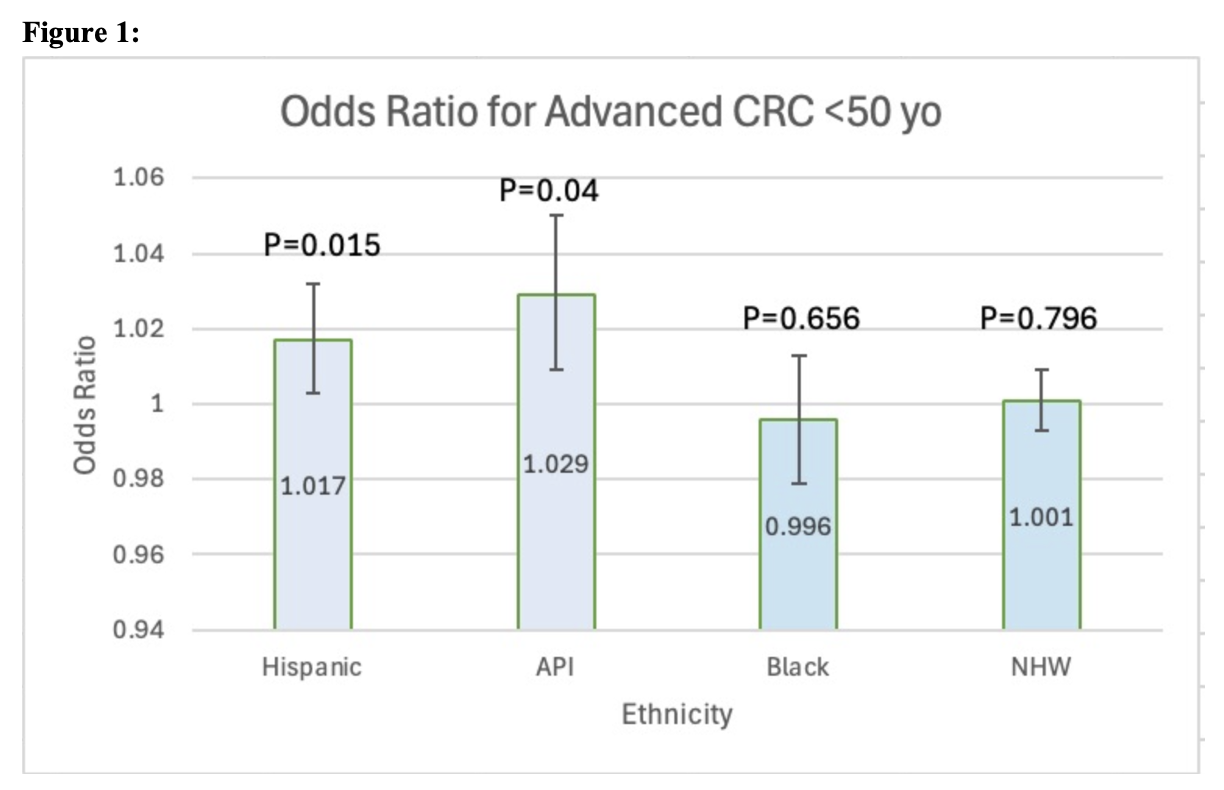Sunday Poster Session
Category: Colorectal Cancer Prevention
P0467 - Trends and Disparities in Advanced-Stage Colorectal Cancer Diagnoses Among Patients Under 50 Years: A SEER Analysis, 2011–2021
Sunday, October 26, 2025
3:30 PM - 7:00 PM PDT
Location: Exhibit Hall
- KB
Karmen Brar, MD
University of Connecticut Health
Farmington, CT
Presenting Author(s)
Karmen Brar, MD1, Arup Ganguly, MBBS2, Osama Siddique, MD3
1University of Connecticut Health, Farmington, CT; 2University of Connecticut Health Center, Hartford, CT; 3Connecticut GI, Wallingford, CT
Introduction: The incidence of colorectal cancer (CRC) in individuals under 50 years has been rising, with increasing number of cases being diagnosed at more advanced stages. The U.S. Multi-Society Task Force on Colorectal Cancer, which includes the American Gastroenterological Association, reports that early-onset CRC (EO-CRC) is more likely to be diagnosed at an advanced stage compared to late-onset CRC (LAO-CRC). Younger patients also face a relatively higher risk of presenting with regional or distant metastasis. Our study examines trends in stage distribution and ethnic disparities in advanced-stage CRC diagnoses among patients under 50 years from 2011 to 2021 using SEER data.
Methods: We analyzed data from 340,148 patients with localized or advanced-stage CRC (2011–2021) from SEER. Among them, 45,902 were under 50 years, and 294,246 were 50 years or older. Logistic regression was used to assess the odds of advanced-stage diagnoses and trends over time. We also evaluated ethnic disparities among non-Hispanic White (NHW), Black, Hispanic, and Asian/Pacific Islander (API) patients under 50. Statistical significance was defined as p < 0.05.
Results: Patients under 50 years were significantly more likely to present with advanced-stage CRC compared to localized-stage CRC (OR = 1.948, p < 0.01), whereas patients aged 50 or older showed lower odds (OR = 1.453, p < 0.01). Among patients under 50, the odds of advanced-stage diagnoses increased by 2.5% annually from 2011–2021 (OR = 1.025, p = 0.01) across all ethnic groups. Significant ethnic disparities were observed in advanced-stage diagnoses. Hispanic patients experienced a 1.7% annual increase (OR = 1.017, p = 0.015), and API patients saw a 2.9% annual increase (OR = 1.029, p = 0.04). No significant trends were observed for Black (OR = 0.996, p = 0.656) or NHW patients (OR = 1.001, p = 0.796).
Discussion: Patients under 50 years are more likely to present with advanced-stage CRC, with the odds increasing over the past decade. Hispanic and API patients showed significant annual increases in advanced-stage diagnoses, when compared to Black and NHW populations. These trends highlight the urgent need for targeted public health outreach initiatives that focus on early detection, awareness, and addressing ethnic disparities in CRC care.

Figure: Odds Ratio for Advanced CRC <50 YO

Figure: Odds Ratio for Advanced CRC <50 YO
Disclosures:
Karmen Brar indicated no relevant financial relationships.
Arup Ganguly indicated no relevant financial relationships.
Osama Siddique indicated no relevant financial relationships.
Karmen Brar, MD1, Arup Ganguly, MBBS2, Osama Siddique, MD3. P0467 - Trends and Disparities in Advanced-Stage Colorectal Cancer Diagnoses Among Patients Under 50 Years: A SEER Analysis, 2011–2021, ACG 2025 Annual Scientific Meeting Abstracts. Phoenix, AZ: American College of Gastroenterology.
1University of Connecticut Health, Farmington, CT; 2University of Connecticut Health Center, Hartford, CT; 3Connecticut GI, Wallingford, CT
Introduction: The incidence of colorectal cancer (CRC) in individuals under 50 years has been rising, with increasing number of cases being diagnosed at more advanced stages. The U.S. Multi-Society Task Force on Colorectal Cancer, which includes the American Gastroenterological Association, reports that early-onset CRC (EO-CRC) is more likely to be diagnosed at an advanced stage compared to late-onset CRC (LAO-CRC). Younger patients also face a relatively higher risk of presenting with regional or distant metastasis. Our study examines trends in stage distribution and ethnic disparities in advanced-stage CRC diagnoses among patients under 50 years from 2011 to 2021 using SEER data.
Methods: We analyzed data from 340,148 patients with localized or advanced-stage CRC (2011–2021) from SEER. Among them, 45,902 were under 50 years, and 294,246 were 50 years or older. Logistic regression was used to assess the odds of advanced-stage diagnoses and trends over time. We also evaluated ethnic disparities among non-Hispanic White (NHW), Black, Hispanic, and Asian/Pacific Islander (API) patients under 50. Statistical significance was defined as p < 0.05.
Results: Patients under 50 years were significantly more likely to present with advanced-stage CRC compared to localized-stage CRC (OR = 1.948, p < 0.01), whereas patients aged 50 or older showed lower odds (OR = 1.453, p < 0.01). Among patients under 50, the odds of advanced-stage diagnoses increased by 2.5% annually from 2011–2021 (OR = 1.025, p = 0.01) across all ethnic groups. Significant ethnic disparities were observed in advanced-stage diagnoses. Hispanic patients experienced a 1.7% annual increase (OR = 1.017, p = 0.015), and API patients saw a 2.9% annual increase (OR = 1.029, p = 0.04). No significant trends were observed for Black (OR = 0.996, p = 0.656) or NHW patients (OR = 1.001, p = 0.796).
Discussion: Patients under 50 years are more likely to present with advanced-stage CRC, with the odds increasing over the past decade. Hispanic and API patients showed significant annual increases in advanced-stage diagnoses, when compared to Black and NHW populations. These trends highlight the urgent need for targeted public health outreach initiatives that focus on early detection, awareness, and addressing ethnic disparities in CRC care.

Figure: Odds Ratio for Advanced CRC <50 YO

Figure: Odds Ratio for Advanced CRC <50 YO
Disclosures:
Karmen Brar indicated no relevant financial relationships.
Arup Ganguly indicated no relevant financial relationships.
Osama Siddique indicated no relevant financial relationships.
Karmen Brar, MD1, Arup Ganguly, MBBS2, Osama Siddique, MD3. P0467 - Trends and Disparities in Advanced-Stage Colorectal Cancer Diagnoses Among Patients Under 50 Years: A SEER Analysis, 2011–2021, ACG 2025 Annual Scientific Meeting Abstracts. Phoenix, AZ: American College of Gastroenterology.
